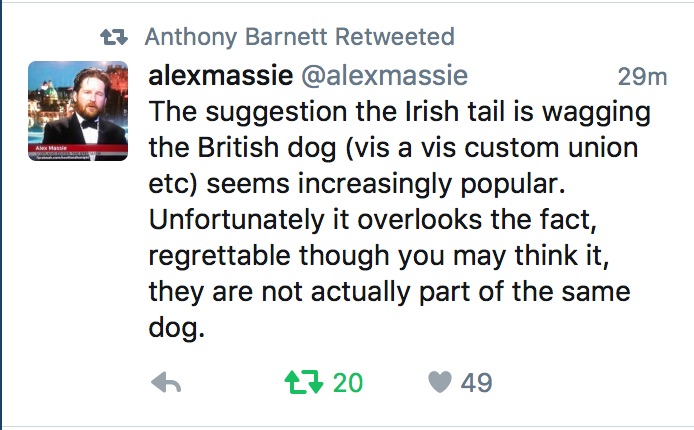Precisely!
Monthly Archives: February 2018
Transparency
Like father, like daughter
On Sunday NBC News’ Peter Alexander asked Ivanka Trump a simple question: “Do you believe your father’s accusers?” Trump responded: “I think it’s a pretty inappropriate question to ask a daughter if she believes the accusers of her father when he’s affirmatively stated there’s no truth to it.”
Jack Shafer is (rightly) having none of this evasiveness.
Trump pleads for recusal from the question, though, not because the question itself is wrong to ask. She pleads for recusal because she thinks it’s wrong for the press to ask a daughter such a question after her father has issued his denials. Do daughters of presidents who are also assistants to the president really get to wave such a flag of privilege? No way. No journalists can make any public official answer a question, so if Ivanka Trump wants to say “no comment,” she should help herself. But to declare a question illegitimate requires more explanation that she volunteers.
Having planted her flag, Trump pours some quick-drying cement at the flagpole’s shaft with her next comment.
“I don’t think that’s a question you would ask many other daughters,” she said.
How to unpack?! Obviously the press won’t ask many other daughters the question because not many other daughters have a father whose alleged paramours have been paid hundreds of thousands of dollars for their silence. Not many daughters have a father who was caught bragging about his sexual assaults on a live mic and then publicly apologized. Not many fathers have been accused of sexual misconduct by at least a dozen women. For those fathers who have such a reputation, it would be reasonable to ask their daughters such questions if they worked for their fathers in government.
Yep. One of the curious by-products of the Trump presidency is its illustration of the power of norms in governing behaviour. There are no laws — as far as I know — explicitly prohibiting a president from exploiting his office for private gain. It was just a norm that presidents didn’t do that. Trump’s great advantage is that he doesn’t do norms. As far as he is concerned, they’re there to be flouted. And like father, like daughter.
Go figure
How to leave an incriminating paper trail using Microsoft Word
This from the Mueller indictment of Paul Manafort:
Manafort and Gates made numerous false and fraudulent representations to secure the loans. For example, Manafort provided the bank with doctored [profit and loss statements] for [Davis Manafort Inc.] for both 2015 and 2016, overstating its income by millions of dollars. The doctored 2015 DMI P&L submitted to Lender D was the same false statement previously submitted to Lender C, which overstated DMI’s income by more than $4 million. The doctored 2016 DMI P&L was inflated by Manafort by more than $3.5 million. To create the false 2016 P&L, on or about October 21, 2016, Manafort emailed Gates a .pdf version of the real 2016 DMI P&L, which showed a loss of more than $600,000. Gates converted that .pdf into a “Word” document so that it could be edited, which Gates sent back to Manafort. Manafort altered that “Word” document by adding more than $3.5 million in income. He then sent this falsified P&L to Gates and asked that the “Word” document be converted back to a .pdf, which Gates did and returned to Manafort. Manafort then sent the falsified 2016 DMI P&L .pdf to Lender D.
And here’s Jacob Brogan’s summary in Slate:
So here’s the essence of what went wrong for Manafort and Gates, according to Mueller’s investigation: Manafort allegedly wanted to falsify his company’s income, but he couldn’t figure out how to edit the PDF. He therefore had Gates turn it into a Microsoft Word document for him, which led the two to bounce the documents back-and-forth over email. As attorney and blogger Susan Simpson notes on Twitter, Manafort’s inability to complete a basic task on his own seems to have effectively “created an incriminating paper trail.”
Cat librarian
Music room
Managing the future that’s already here
This morning’s Observer column:
As the science fiction novelist William Gibson famously observed: “The future is already here – it’s just not very evenly distributed.” I wish people would pay more attention to that adage whenever the subject of artificial intelligence (AI) comes up. Public discourse about it invariably focuses on the threat (or promise, depending on your point of view) of “superintelligent” machines, ie ones that display human-level general intelligence, even though such devices have been 20 to 50 years away ever since we first started worrying about them. The likelihood (or mirage) of such machines still remains a distant prospect, a point made by the leading AI researcher Andrew Ng, who said that he worries about superintelligence in the same way that he frets about overpopulation on Mars.
That seems about right to me…
The window
A window in Jim and Helen Ede’s house — part of the newly-extended and much-enhanced Kettle’s Yard gallery in Cambridge.
Quote of the Day
”We must make our choice. We may have democracy, or we may have wealth concentrated in the hands of a few, but we can’t have both.”
Justice Louis Brandeis






